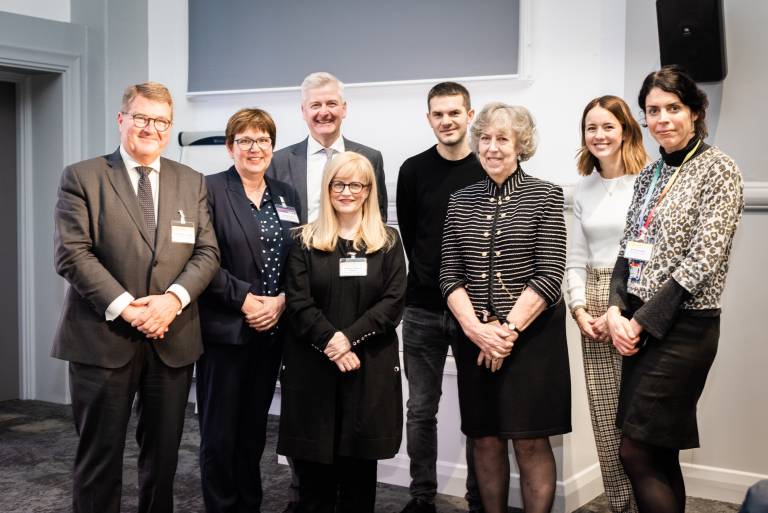UCL TRO/Wellcome Trust Translational Partnership Award Launch: An Overview
23 January 2020
The UCL Translational Research Office highlight the success of the launch event and encourage researchers to get involved with translational training opportunities and join the Therapeutic Innovation Networks (TINs).

The highly anticipated UCL/Wellcome Trust Translational Partnership Award (TPA) launch took place on Tuesday to celebrate the partnership between the two institutions with the shared aim of enhancing the culture and widening participation in biomedical translation to deliver a real impact on patients. The event recognised the types of translational research taking place at UCL by showcasing activities of Wellcome Trust funded UCL researchers at various stages of their careers and highlighting the translational support they have received.
The UCL Translational Research Office (TRO) event was kicked off by Professor Alan Thompson, TPA recipient, who chaired the session and highlighted the 2 key parts of the award: to support Early Career Researchers through translational training, and to share knowledge through supporting the Therapeutic Innovation Networks (TINs).
Baroness Eliza Manningham-Buller (Chair, Wellcome Trust) also gave an introduction to the partnership. She provided insight into the evolution of Wellcome‘s science strategy, including the aims behind the TPA, which is to transform lives through better translational medicine. A particularly proud moment was hearing UCL described as doing translation “better than many” – however we are still aware that further support is needed for the next generation to be encouraged and supported to engage in translation should their science and interest take them in that direction.
The first presenter of the afternoon was Dr Claire Roddie, who highlighted a number of UCL TRO and UCLB supported projects within the UCL CAR T-cell programme. She emphasised the importance of early seed funding in translational research and how these small pots of money have led to project progression and follow-on funding to a position where the projects are reaching clinical trials. Since the meeting, Dr Roddie has expressed interest in taking on a more active role within the Cell, Gene and Regenerative Medicine community.
“The UCL Translational Research Office have been pivotal in bringing our studies to life" – Dr Claire Roddie, Consultant Haematologist.
Professor Eleanor A. Maguire then introduced her work involving moving brain imaging to the real world with the development of “OP-MEG”, a highly sensitive wearable technology, which can be combined with virtual reality so that a patient can be put into any type of simulated “real world” scenario while clinicians can look at how their brain responds. In the Q&A after the talk, an audience member commented that this example is particularly interesting as it represents an example of a technology being repurposed rather than a drug.
The exciting field of gene therapy at UCL continued as the afternoon moved onto the use of lentiviral vectors with Dr John Counsell, who aims to show the first clinical application of neonatal liver gene therapy with his patented (with the support of UCLB) lentiviral vector.
Following this, Dr Lucy Thorne, who has identified IFITM3 as the protein that blocks viral infection, presented her work on using this knowledge to advance stem cell gene therapy. She described her partnership with Professor Dave Selwood who has modified cyclosporine to be more efficient at inhibiting IFITM3, which has the potential to lead to more successful delivery of gene therapy to the stem cells via the viral vector.
After hearing from the inspirational translational case study examples, Head of the Translational Research Group, Dr Pamela Tranter, reinforced the benefits of multidisciplinary networks in translation and introduced the exciting new initiatives surrounding the UCL TRO Therapeutic Innovation Networks (TINs). This included upcoming TINs events and training dates for your diaries:
Event Type | Event | Date |
|---|---|---|
Training | Building your professional network | Wednesday 4th March |
Training | What's the big idea? Pitching skills | Wednesday 22nd April |
All TINs | Funders Workshop Translational talks & Funder stands | Thursday 23rd April |
Biologics | Biochem Engineering Showcase Including pilot fund launch | Wednesday 29th April |
Dr Tranter also revealed a call to join the TIN committees to help shape and accelerate translation at UCL around a specific therapeutic modality and encouraged researchers at any career stage to get involved. For more information, please contact the UCL TRO.
Overall it was an extremely enlightening and inspirational afternoon of talks which was wrapped up by Professor David Lomas reminding us of the importance of partnerships to achieve excellence in science. This is already seen in UCL’s partnerships with the Wellcome Trust and with our NIHR partner hospitals, with Professor Lomas stating “without each other we would be nothing”. He then described how partnerships within our own institution are so important in bringing the wider university together.
This led nicely to a 2 hour networking session giving attendees a chance to build connections and become familiar with UCL translational research support teams including the TRO, TINs, Academic Careers Office (ACO), UCLB and Innovation & Enterprise – all of which provide support and know-how applied to projects along various parts of the translational pathway.
If you missed the event or wish to learn more about any of the opportunities described, please contact the UCL TRO for more information and/or visit the TINs website.
 Close
Close

